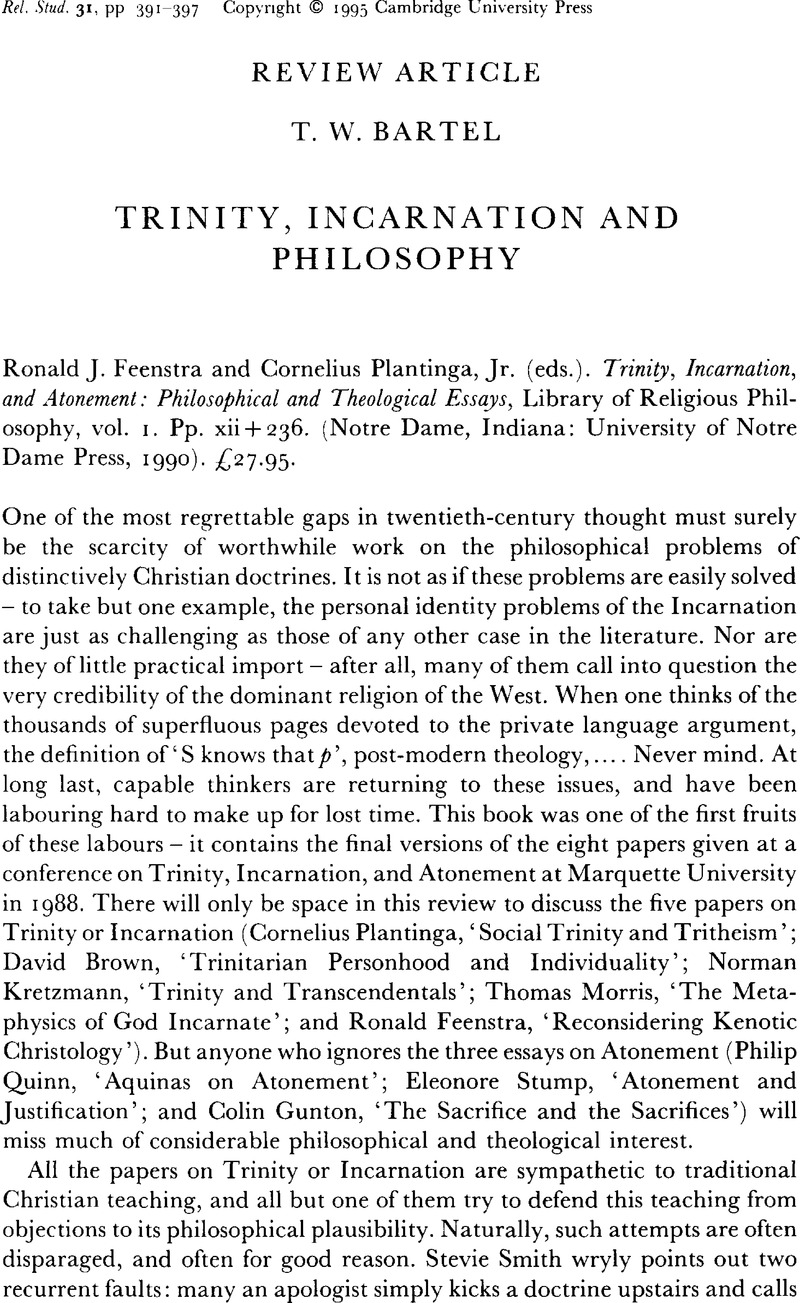No CrossRef data available.
Article contents
Trinity, Incarnation and Philosophy
Published online by Cambridge University Press: 24 October 2008
Abstract

Information
- Type
- Review Article
- Information
- Copyright
- Copyright © Cambridge University Press 1995
References
1 ‘Some Impediments to Christian Commitment’, a lecture to parishioners of St Cuthbert's, London, 9 December 1968, first published in Barbera, J and McBrien, W., Me Again (London: Virago Press, 1981), pp. 153–70;Google Scholar quotation from p. 166.
2 As is cogently argued in Plantinga's article (pp. 40–2).
3 Stevie Smith, ‘Oh Christianity, Christianity’, Barbera and McBrien, pp. 165–6.
4 My argument that this version of Social Trinitarianism follows from failures of Trinitarian substitutivity is spread over two papers: ‘The Plight of the Relative Trinitarian’, Religious Studies, XXIX (1988), pp. 129–55,Google Scholar and ‘Could There Be More Than One Lord?’, Faith and Philosophy, XI (1994), 357–78.Google Scholar
5 I have argued for this at greater length in ‘Could There Be More Than One Almighty?’, Religious Studies, XXIX (1993), pp. 465–95,Google Scholar at pp. 468–70.
6 For further discussion, see Swinburne, R. G., ‘Could There Be More Than One God?’, Faith and Philosophy, V (1988), pp. 230–1;Google Scholar and my ‘Could There Be More Than One Almighty?’
7 See, for example, Plantinga, Alvin, Does God Have A Nature? (Milwaukee: Marquette University Press, 1980), pp. 37–61;Google ScholarMorris, Thomas, ‘On God and Mann: A View of Divine Simplicity’, Religious Studies, XXI (1985), pp. 299–318;CrossRefGoogle ScholarHughes, Christopher, On a Complex Theory of a Simple God (London: Cornell University Press, 1989),Google Scholar chapters 1–6.
8 London: Cornell University Press, 1986.
9 For the sake of convenience, I, like Morris, am making a notoriously controversial assumption – that some reductionist theory of co-personality is true. But my criticism of Morris could be recast without this assumption: one could say that (P) supervenes upon our evidence for co-personality, and therefore cannot be cited as a legitimate reason for believing in the co-personality of the two minds.
10 First presented by Wiggins, David, in Identity and Spatio-Temporal Continuity (Oxford: Basil Blackwell Books, 1967), p. 50.Google Scholar My statement of this case is borrowed from Parfit, Derek, Reasons and Persons (Oxford: Oxford University Press, 1984), pp. 254–5.Google Scholar
11 For further discussion of this problem, see my ‘Why the Philosophical Problems of Chalcedonian Christology Have Not Gone Away’, The Heythrop Journal, XXXVI (1995), pp. 153–172.Google Scholar
12 Pp. 97–100.
13 I am not sure, though, that this is the only way that the Trinity could avoid conflict of will; see my ‘Could There Be More Than One Almighty?’, p. 484. Richard Swinburne maintains that if the kenotic theologian supposes that the Trinity adopts some mechanism to ensure that at least one divine being is always in control of the universe, this complicates kenotic Christology and therefore renders it less probable; see The Christian God (Oxford: Clarendon Press, 1994), p. 233.Google Scholar But any Chalcedonian Christian should, on pain of logical implausibility, accept Plantinga's version of Social Trinitarianism, which raises the problem of explaining how the members of the Trinity necessarily avoid willing incompatible states of affairs. Suppose, then, that a non-kenotic Christologist proposes some solution to this problem. Since the application of this solution to the special case of avoiding complete Trinitarian kenosis is trivial, the supposition of a mechanism for preventing complete kenosis need not increase the complexity of kenotic theology.
14 I have argued, however, that it is far from clear that Chalcedonian orthodoxy is committed to the claim that Jesus Christ possesses all of the attributes which are essential for belonging to the kind humanity. See ‘Like Us in All Things, Apart from Sin?’, Journal of Philosophical Research, XVI (1991–1992), pp. 19–52.Google Scholar

